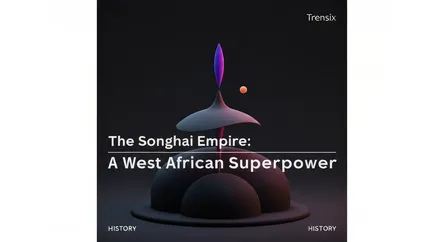History
The Songhai Empire: A West African Superpower

Explore the Songhai Empire, one of Africa's largest states in history, renowned for its control of trade, wealth, and centers of learning.
What is it?
The Songhai Empire was a powerful state in West Africa that flourished during the 15th and 16th centuries. At its peak, it was one of the largest empires in African history, succeeding the Mali Empire to control vast territories. With its capital at Gao, the empire managed crucial trans-Saharan trade routes, dealing in gold, salt, kola nuts, and slaves. Under formidable leaders like Sunni Ali and Askia the Great, the empire expanded to include major commercial and scholarly centers such as Timbuktu and Djenné. Its government was centralized, with a strong army and a fleet of war canoes on the Niger River.
Why is it trending?
The history of the Songhai Empire is gaining attention as it challenges traditional narratives about Africa's past, showcasing a highly organized and wealthy society long before European colonization. There is growing interest in pre-colonial African civilizations that demonstrates immense political, economic, and cultural achievements. The empire's sophisticated bureaucracy, tax system, and promotion of Islamic scholarship at universities in Timbuktu are subjects of historical rediscovery. Its legacy influences the culture, trade, and traditions still visible in modern West African nations, making its history relevant today.
How does it affect people?
The Songhai Empire profoundly shaped West African society by unifying diverse ethnic groups under a single administration. Rulers like Askia the Great implemented Islamic law, established schools, and created a stable environment for trade to flourish, which brought great wealth to its cities. Society was hierarchical, with nobles and merchants at the top, while the majority of people were farmers. The empire's eventual fall to Moroccan invaders in 1591, who possessed gunpowder weapons, led to the fragmentation of the region into smaller states and marked the end of an era of large West African empires.